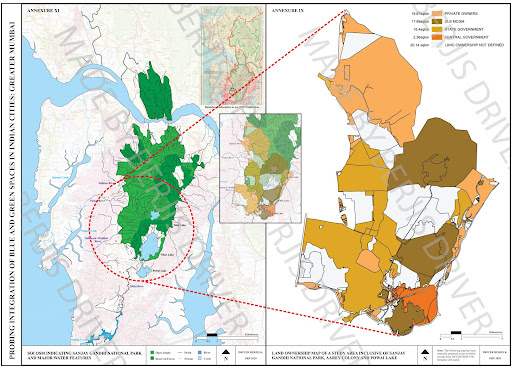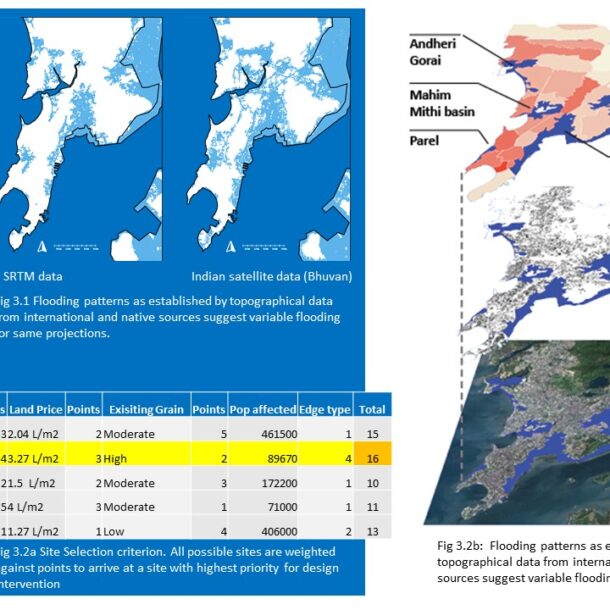
Socio-ecological resilience of coastal area: A case of Eastern Waterfront of Mumbai
The Marine ecosystems are among the most productive and dynamic environments on the earth due to the services it provides, to a significant proportion of the world’s population dependent intimately on the coastal resources, for their survival and wellbeing. The coastal and marine environment comprise a wide variety of diverse habitat and ecosystems. The linkages between these habitats and ecosystems are essential for the maintenance of food webs, migration routes and increased productivity. These functions generate goods (e.g. fish, seaweed, oil and gas and minerals) and services (e.g. mangroves protecting the coasts against the storms, tidal wave; transport and recreation). Such goods and services have an economic importance.
Rapid urbanization and large number of environmentally destructive projects along the coastal areas have been causing irreversible damage to this fragile coastal and marine ecosystem, subsequently destroying the livelihoods of coastal communities, especially the fisher folks. Mumbai’s artisanal fisher folks, the Kolis, due to such reasons are severely subjected to survival and livelihood pressures. This article deals with the study of the coastal socio-ecological systems with a focus to examine the pressures subjected on the coastal communities and marine ecology due to the land based activities. Besides, it also analyses the need to improve the adaptive capacities of the social and ecological indicators of the coastal areas, thus improving the resilience.

Socio-Ecological Analysis of Mahul-Sewri region
The site selected for the study is Mahul- Sewri area, located along the Eastern waterfront of Mumbai that has been a vital part of Mumbai’s identity, with its contribution to economic growth, due to the Bombay Port Trust and unique ecological character. Mahul and Sewri accommodate fishing villages wherein the communities carry out small-scale traditional fishing. The selected area also falls under (Coastal Regulation Zone) CRZ – I that incorporates ecologically sensitive areas, as per CRZ 2011 notification.
The diversified land based activities considered in the study include the coal, oil and ship breaking discharges draining out in the sea due to the port activities. Along with, eight major industries whose type and current spatial extents are restricted as per the CRZ norms. Also the sewage disposed through the Mithi river channel contributing to contamination into the sea causing major impact on marine ecology is also studied. These urban actions are impacting the livelihood of the coastal communities who are dependent on this sea for primary resources.
A baseline study was conducted to assess the impact caused by the land based activities on the following Social and Ecological Indicators:
Ecological indicators
- Fish production
- Mangrove extent
- Migratory birds
- Social indicators
- Fisher folk community
Social Indicators:
- Demography
- Livelihood
- Health
The ecological and social services were qualitatively and quantitatively analyzed in order to determine the impact of the land based activities on a particular service. And the indicators that were impacted on a high range scale by the selected activities were the fish produce, the mangrove and the livelihood causing an IMPACT FACTOR of 3.5 out of 5 as per application of the Leopold Matrix method. Existing National, State level, Non-governmental and community based policies and schemes were studied along with their status of implementation on site. The reasons for the ineffective implementation of the policies and schemes were identified to analyze the existing adaptive capacity. The Turner’s Vulnerability Framework has been applied to assess the vulnerability by combining the exposure and sensitivity to understand the threats and the adaptive capacity of each of the functions.
My Vision for Mumbai’s Green Recovery:
Adaptive measures and strategies were formulated as per the threats identified:
- Frameworks for preparedness & response action of industries are to be promoted for quick and effective response action during the occurrence of any hazard.
- A basic design of the Ship Recycling Plot has been proposed to avoid hazardous impacts caused due to port activities, constructed of impermeable concrete pavement and drain ditch at the edge, to capture oil or oily water and a pit to store the same.

- The map shows the location of a proposed Sewage Treatment Plant(STP) as per its technical and geographical suitability by MPCB(Maharashtra Pollution Control Board) standards.

- To promote phytoremediation that refers to use of plants to partially or completely remediate the contaminants from the soil, sludge and wastewater.

Hence by building the capacity of the functions and reducing the threats by mitigation measures and adaptive strategies caused through diversified land based activities, the aim of increasing the coastal resilience of the social and ecological functions has been addressed.
For Mumbai Matters:
Name: Deepshikha B. Majumdar
Organization: Urban Planner, Mars Planning And Engineering Services Pvt. Ltd.
Deepshikha is a practicing architect and environmental planner, born and brought up in Mumbai.She has obtained B. Arch from Sir J.J. College of Architecture, Mumbai & Masters in Environmental Planning from School of Planning & Architecture, Bhopal and has been associated with works ranging from architectural & interior based projects, urban planning, sustainable & climate resilient developments. She believes that planning is all about building places for communities considering a holistic socio-ecological systematic approach and design paradigm that applies sustainability-related concepts in a spatial setting.

Waatavaran Climate Environment & Sustainability Foundation is a not-for-profit company incorporated and registered under Section 8 of the Companies Act, 2013. All donations made to Waatavaran are eligible for income tax deduction under Section 80G of the Income Tax Act.
Contact Us
REGISTERED ADDRESS
L-4/906, Swapnapurti, Sector 36, Kharghar, Navi Mumbai – 410210, Maharashtra, India
OFFICE ADDRESS
59/A, 1st Floor,
Kamgar Nagar Road,
Near Shetty Infra Services,
Kurla East,
Mumbai, Maharashtra – 400070
Email: [email protected]
Mobile: +91-8850903025 / +91-9221250399
Copyright © 2022 | Site By: Creatiwitty


